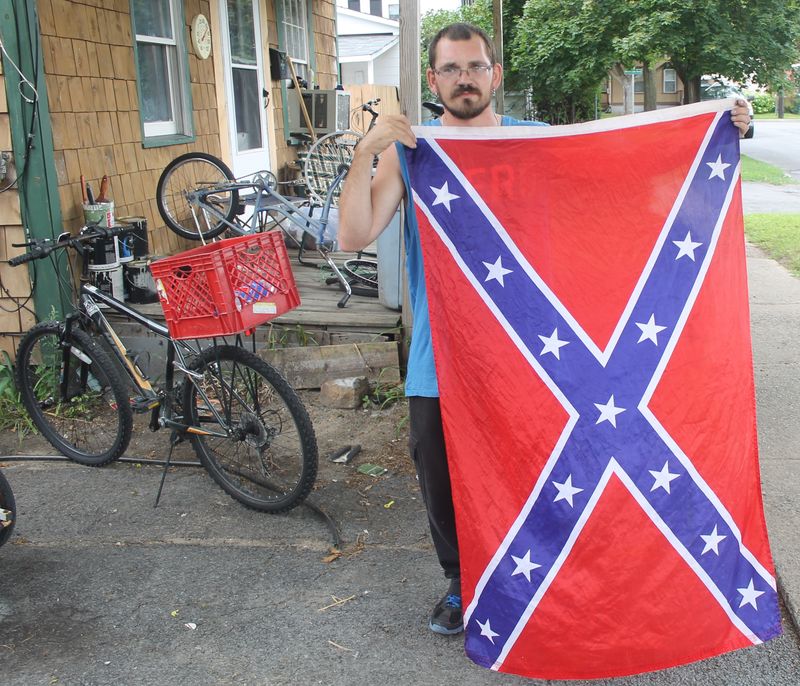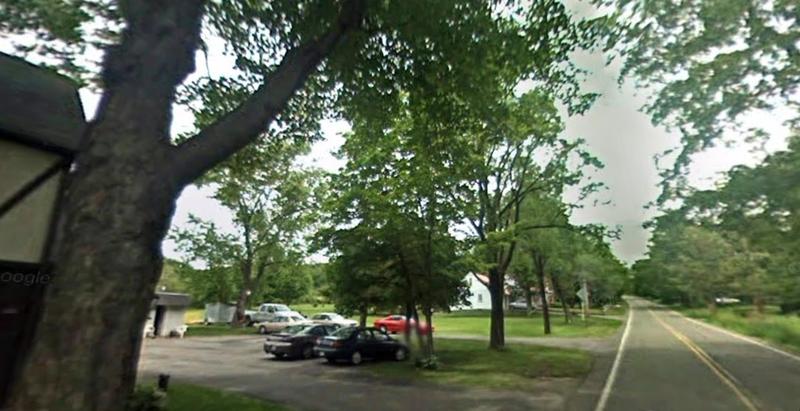
Why do New Yorkers fly the Confederate flag?
Following the violence at a white supremacist rally in Charlottesville in August, WNYC and other public radio stations across the state sought to answer that question.
We asked the audience for help in locating flags around New York, and we received more than 200 reports — from the East Village in Manhattan to Plattsburgh near the Canadian border. While this is by no means exhaustive, it helps confirm the idea that the Confederate flag is not an exclusively-Southern symbol, but one that is embraced all over America.
Here, we focus on three cases of Confederate flags found around New York, and the reasons their owners fly them.
A Sign of Pride, and Retaliation
Zach Hirsch, a reporter with North Country Public Radio, didn't have to go far to find a Confederate flag owner: his neighbor in Plattsburgh displayed one for a period earlier this year.
The neighbor, Ricky Barber, 30, moved to New York from Georgia, and said the flag is a sign of his Southern pride, as well as a form of defiance.
"You'll hear all these people that gathered down South that are blacks. What about their Black Lives Matter flags?" asked Barber.
"That's pushing back on the white people. Us white people, we retaliate by 'Hey, we got a Confederate flag and whatnot.'"
"We are not a racist couple, and we own the flag," said Barber's fiancée, 28-year-old Becca Lee. "I don't judge people, I don't care what color skin they are, if they need defending I'm going to defend them. That's what a Southern belle does."
Then, as Hirsch watched, a strange scene ensued. Barber gestured to a black teenager playing on the street nearby.
"Are you opposed to the flag at all?" Barber asked the teen. "Do you have a problem with the flag, as a black person?"
According to Hirsch, the teenager responded: "'Yeah, it is offensive to me. This is the flag of people who want to bring slavery back.'"
This apparently caught the white couple completely off-guard. They offered to sit down with the teen at some point and explain what the flag meant to them.
But what, one may ask, prompted Barber to even ask the question of a 13-year-old?
Hirsch had an explanation: he thought Barber and his fiancée were looking for "an out," meaning that even as the owners of a Confederate flag, they sought some form of validation from African Americans.
You can hear Zach Hirsch's full story on NPR's Weekend Edition.
An Act of Secession
Tim, who didn't want to give his last name, is a farmer who lives in Broome County, near Binghamton. He was interviewed by Monica Sandreczki, Managing Editor at WSKG.
Tim raises goats and chickens. One of his dogs is named Dixie, the other after P.G.T. Beauregard, a Confederate general whose statue was taken down from its pedestal in New Orleans this year. He is a Civil War nostalgist, but as someone who was raised in New York he thinks opportunity has dried up, and that the best way to revitalize the upstate economy is to secede from downstate. He said he flies the Confederate flag for that reason.
"It's kind of a sign of, we seceded once and maybe in New York state we should secede again," he explained. "I think that New York state needs to break away from New York City. New York City has separate needs from here, it's a separate world, and upstate New York cold be a very great place to live. Right now in the situation it is, we're talking about moving down South to a better tax state. And the North isn't for us anymore. And we kind of long to be down South."
"Rural America and non-urban America is kind of like a nationality now, it's a very different culture," said Adam McGovern, a semiotics analyst, i.e., symbols expert. "And I think the Confederate flag is a symbol of that other, economically-depressed, culturally-disfavored America."
"He is my brother and I love him"
Of all the people who responded to our call for Confederate flag sightings, Judy, who asked that we only use her first name, stood out. She said there was one hanging in her son's bedroom.
Judy's adult son, Tristan, lives at home with her. She said he has had a Confederate flag for years, so long that she had never thought much about it.
Until Charlottesville.
"He feels an affinity to the south, and to southern music," she reasoned.
"He latches on to things that help him to feel rooted in some way," explained his older sister, Julia, a mental health worker, "and I don't know that he's fully conceptualized what that means for him yet."
Both Judy and Julia's answers were tentative, and clearly protective of Tristan.
"I'm getting the feeling he doesn't have any hate," said Judy. "Tristan has a wide variety of ethnic friends. He's got black, Mexican, Honduras, you name it."
And then, she opened up.
"I told him recently that I had a date," said Judy. "And he said, 'As long as he’s not black.'"
"I don’t know where this is coming from," she said. "I often wish he would meet a black woman that made him very happy. Because to me that’s what it’s all about: you meet someone who makes you happy and you fall in love. He doesn’t like that idea."
Why not?
Judy said Tristan felt the races should not mix.
Later, Julia expressed the complexity of her feelings in an email.
"I honestly cannot recall the first time I saw the Confederate flag in my brother's room," she wrote. "I don't know where he got it or what his motivations are for having it. What I've felt lately though is sad, shamed, and angry with him, along with the paradoxical desire to defend his character as well as to hide this part of him. The concrete-ness of the flag, its history, and what it continues to symbolize--intolerance, ignorance, narrowmindedness, and hate--makes it difficult to defend a person who chooses to be in possession of one, but he is my brother and I love him."
She continued, "If I had a friend who displayed the flag, I would not tolerate it at all. I would not be kind or compassionate. I wonder what this means about me. I ultimately feel helpless. Can I change his ways of thinking? Can I handle that responsibility? Are occasional, brief conversations over coffee enough to inspire informed insight into his mind and heart?"
"I am left with more questions than answers."
WNYC is part of the Documenting Hate project, which gathers and verifies reports of hate crimes and bias incidents. If you have an incident to report, or for more details, please visit Documenting Hate.



